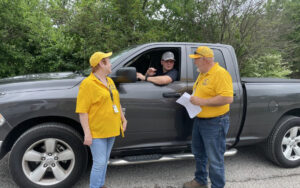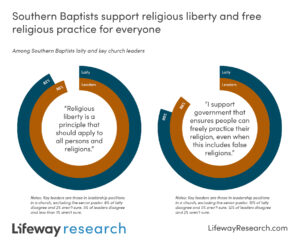By Lisa Misner
The Illinois Baptist
The group of church leaders expressed their own experiences with mental issues. A recently widowed pastor shared how his congregation didn’t know how to minister to him, leaving him to grieve alone at home where he’d fallen into a deep depression. A mother said she’d found a letter her daughter had written expressing suicidal thoughts. Frightened and needing advice, she took it to her pastor who told her not to worry: “It’s just a phase teens go through,” he advised her.
They were at the recent Midwest Leadership Summit in Springfield, Illinois, and were gathered for the breakout session on “Mental Health: The Church’s Response,” led by Sandy Wisdom-Martin, WMU national executive director-treasurer. It was an overview of WMU’s Christian Leader Learning online course, “Mental Health: The Church’s Response” for individual church members or small groups.
Wisdom-Martin shared a series of statistics that provided support to their experiences.
“One-in-five people are affected by some kind of mental health issue,” she said. “And, one-in-20 experience a serious mental health challenge. Suicide is the second leading cause of death among people ages 10–24.”
One of the reasons it’s so vital the church prepares itself to help is because the church is often one of the first places people turn to for help, the course teaches. Kay Bennett, the executive director of Baptist Friendship House in New Orleans, is featured in the course’s video.
“Mental health challenges are not often the result of sin or mistakes,” Bennett said. “Churches can take away the stigma that is attached to mental health and be a community of support.”
It’s that stigma, along with a lack of resources and denial that can keep people from dealing with the mental health challenges which may be brought on by trauma.
What pastors are, aren’t saying
A recent study by Lifeway Research found 54% of Protestant pastors have known at least one member of their church who has been diagnosed with a severe mental illness such as clinical depression, bipolar disorder, or depression. Of those same pastors, 26% say they’ve personally struggled with mental illness, with 17% professionally diagnosed and the remaining 9% self-diagnosed. Nearly three-quarters (74%) of pastors say they’ve never personally experienced any type of mental illness.
Most pastors (60%) say they speak about mental illness in sermons or in a large group setting at least once a year. While at least 2-in-5 bring the issue up multiple times a year, 9% about once a month, and 4% several times a month.
“While the typical pastor hasn’t experienced mental illness themselves, they are proactively teaching about this need and feel a responsibility to help,” said Scott McConnell, executive director of Lifeway Research. “While preaching on mental illness is the norm and even more pastors feel their church is responsible to help the mentally ill, still 37% of pastors rarely or never bring it up from the pulpit.”
According to Lifeway Research, 9-in-10 pastors agree “local churches have the responsibility to provide resources and support for individuals with mental illness and their families.” They report doing this by maintaining a resource list of experts (68%), having a plan to provide support for families (40%), providing training that offers encouragement (26%), and offering programs like Celebrate Recovery (26%). Others say they provide training for leaders to identify the symptoms of mental illness (20%), have a counselor on staff (18%), or provide another type of resource (7%).
Dealing with depression
Wisdom-Martin’s session focused on a common mental health concern, depression.
“We want to help you help them by recognizing signs and symptoms,” she emphasized. “Early on the person’s appearance can be a sign. They may become unkempt. They may become a little angry.”
There will be times, she stressed, we won’t be qualified to solve the problems we encounter.
“Our job is not to be a diagnoser or a fixer of the problems,” she noted. “Our job is to walk alongside them to get the help they need and to support them.”
Jennifer Smith is an Illinois Baptist Disaster Relief chaplain and a member of Lincoln Avenue Baptist Church, Jacksonville. She’s had training in dealing with a variety of emotional and mental issues, most recently from the American Association of Christian Counselors (AACC).
“If we can catch people [when problems start] we can save a lot of grief in the future,” Smith noted. “If you have a physical problem, you get an over-the-counter medicine. If it doesn’t work, you see physician. Then you may need to go to the ER. With mental health there’s no continuum. That’s where the church could sit in the middle. The church just needs lend an ear to listen.”
Recognizing problems where they start
Like Wisdom-Martin, Smith emphasized the importance of recognizing problems when they start.
“We need to better recognize the signs of when they need help and have a contact list prepared. … The closer the contacts we have in the community, whether it’s the pastoral counselor, the abuse counselor, or another, researching the partners we have to work with getting outside our bubble is important.
“It’s really Christ who’s going to work with you,” Smith ultimately believes. “He will do everything through every available vessel for those who will work with him.”
How we talk about mental health matters, said Wisdom-Martin. She suggested using first person languages. Her examples included “she lives with bipolar,” not “she has bipolar.” Instead of saying “she’s an addict,” say “she has a substance abuse challenge.”
“It’s hard for us to be vulnerable, but it’s necessary for us to be vulnerable and let people know we are right there with them,” Wisdom-Martin said.
Some early signs of depression last more than a day or two, said Wisdom-Martin. Examples include when a person becomes uninterested in a favorite hobby, looks tired most of the time, appears more unkempt than usual for the individual, has declining hygiene, or expresses hopelessness.
Wisdom-Martin said it’s important to let that person know that you are concerned. “Make sure they know you are there to walk along beside them,” she said. But if that person becomes violent or begins to threaten their own life or someone else’s, it’s time to seek professional help.
Putting training into practice
“It’s important to be willing to walk with people and be present when it’s uncomfortable” said Melissa Pryer, a registered dietician and member of Ten Mile Baptist Church in McLeansboro.
“We don’t always have to able to fix [the problem] or speak wisdom. Sometimes it’s enough just to say ‘I’m sorry’ and be able to hug them,” she said. Pryer recently completed her certification to become a Christian mental health coach through AACC. Her husband, Jared, is a licensed clinical counselor.
Pryer works with youth in her church and said it was important for her to “gain a credible Christian-based perspective” on mental health.
“Topics can dive off into areas I’m not comfortable with,” she said. “I wanted to be prepared when those things develop in front of me. It gives me a framework to not be able to react, and to develop a response when talking about things that are hard in their world.”
That can mean not reacting when youth make statements, but asking “good questions” instead. “Sometimes we need not to be a fixer, but guide with good questions that help them see the answers,” Pryer explained. “When working with teens, never make a statement when you can ask a question that opens a door for a conversation — because it shows respect for their personhood.”
Lindsay Wineinger said she “jumped at the chance” to take a Mental Health First Aid course. The former president of Illinois WMU and member of Woodland Baptist Church in Peoria, said she found the knowledge she obtained to be “incredibly helpful for my work with Super Summer (IBSA’s annual student leadership ministry) and just being with students at my church.
Showing compassion
“With knowledge comes compassion, making sure I felt the empathy the students need,” Wineinger said. “The last thing I wanted is for my kids to feel judged when they’re dealing with the panic attached to mental illness or suicide.”
She is also using the training in her volunteer work with the women and children’s shelter near her church.
“It’s helped me to understand how their past experiences may deal directly with why they may not want our help,” she said. “Before I may have taken it personally, but now I know it’s not us. It’s what’s happened to them in the past.”
Wineinger said she believes having church members trained to recognize and help those with mental needs “can only benefit the church as a whole.” In her experience, she noted, “It’s creating an avenue where we can step in, and [an opening] for the gospel where we can share Jesus with hurting people.”









Comments are closed.